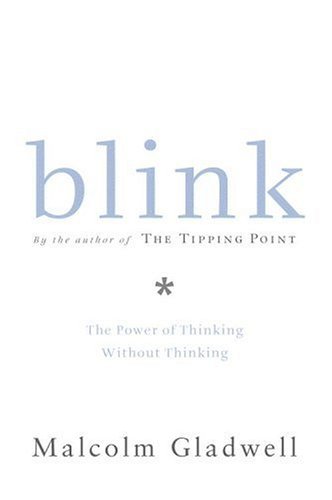
Blink: The Power of Thinking Without Thinking is about rapid decision making and thin-slicing, which means making large judgments from very little information. It offers case studies and examples of these instincts in several situations, from art forgery to marriage counseling to taste testing. Gladwell provides explanations as to why and how our brain can make immediate judgments that are usually correct, often times even more accurate than when those decisions occur methodologically.
I really enjoyed the book for its clear explanation of a complicated idea and its several examples to illustrate Gladwell’s thesis. Blink follows several case studies of rapid cognition. The book opens with an example from the Getty Museum. Scientists, archaeologists, artists and curators puzzled over a statue called a kouros. They could not determine whether it was real or fake. Intuition pointed to fake, but tests and studies indicated that it was real. Gladwell explains that humans often have an instinctive reaction to something that can tell us much more than excessive pondering and studying. Such was the case for the kouros. It was fake, and even though no one could explain why, they just knew it.
Gladwell analyzes this phenomenon throughout the book, using a wide range of examples to show that our adaptive unconscious is always leaping to conclusions and causes our body to adjust accordingly, before we even know it. It’s an interesting facet of human psychology that has only recently begun to be researched.
While an array of examples helped to clarify and personify Gladwell’s point, the book read as a series of studies. I would have enjoyed some more information on the science of the adaptive unconscious and the history of research on it.
Blink clearly and interestingly explained a topic that is foreign to us, even though we are constantly experiencing it unconsciously. It was informative and easily adaptable to leadership and teamwork scenarios; it’s important for us to remember in our daily lives and in the workplace that intuition and reflexive judgments should be regarded highly. We must respect our own and each other’s instinctive insights in order to make effective decisions.
Edited by Vlad Odobescu

This is a really neat topic, Audrey! The human brain does unbelievable things that we’re not even aware of. I think we could all take note to trust ourselves more often instead of always relying on statistics and science for validation.